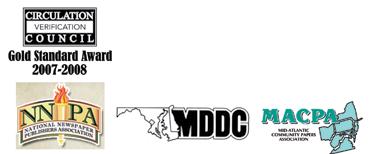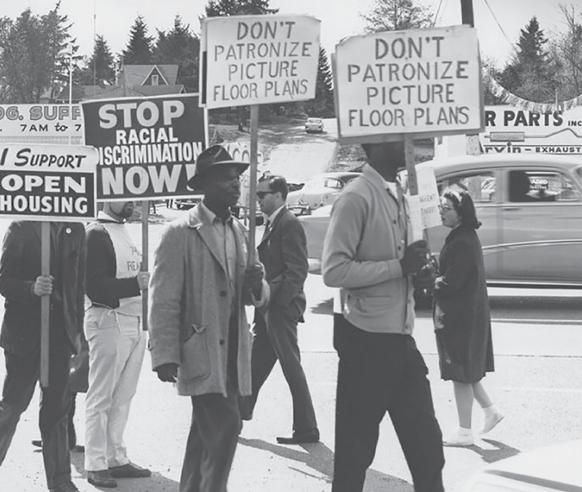
7 minute read
OpEd
NEWSPAPER READING IS A HABIT
DON’T BREAK THE HABIT!


READ THE WASHINGTON INFORMER YOUR WAY:
n In Print – feel the ink between your fingers of our Award Winning Print Edition n On the Web – www.washingtoninformer.com updated throughout the day, every day n On your tablet n On your smartphone n Facebook n Twitter n Weekly Email Blast – sign up at www.washingtoninformer.com
Helping Build Financial Success
Ewunike N Brady Wells Fargo Home Mortgage Diverse Segments


202-561-4100 For advertising contact Ron Burke at rburke@washingtoninformer.com
...Informing you everyday in every way
THE WASHINGTON INFORMER NEWSPAPER (ISSN#0741-9414) is published weekly on each Thursday. Periodicals postage paid at Washington, D.C. and additional mailing offices. News and advertising deadline is Monday prior to publication. Announcements must be received two weeks prior to event. Copyright 2016 by The Washington Informer. All rights reserved. POSTMASTER: Send change of addresses to The Washington Informer, 3117 Martin Luther King, Jr. Ave., S.E. Washington, D.C. 20032. No part of this publication may be reproduced without written permission from the publisher. The Informer Newspaper cannot guarantee the return of photographs. Subscription rates are $45 per year, two years $60. Papers will be received not more than a week after publication. Make checks payable to:
THE WASHINGTON INFORMER 3117 Martin Luther King, Jr. Ave., S.E Washington, D.C. 20032 Phone: 202 561-4100 Fax: 202 574-3785 news@washingtoninformer.com www.washingtoninformer.com
In Memoriam Dr. Calvin W. Rolark, Sr. Wilhelmina J. Rolark
PUBLISHER
Denise Rolark Barnes
STAFF
D. Kevin McNeir, Editor Ron Burke, Advertising/ Marketing Director Shevry Lassiter, Photo Editor Lafayette Barnes, IV, Assistant Photo Editor John E. De Freitas, Sports Photo Editor Dorothy Rowley, Online Editor ZebraDesigns.net, Design & Layout Mable Neville, Bookkeeper Dr. Charles Vincent, Social Sightings columnist Tatiana Moten, Social Media Specialist Angie Johnson, Circulation
REPORTERS
Stacy Brown (Senior Writer), Sam P.K. Collins, Timothy Cox, Will Ford (Prince George’s County Writer), Jacqueline Fuller, Hamil Harris, D. Kevin McNeir, Kui Mwai, Lee Ross, Dorothy Rowley, Brenda Siler, Lindiwe Vilakazi, Sarafina Wright, James Wright,
PHOTOGRAPHERS
Ja’Mon Jackson, Shevry Lassiter, Roy Lewis, Jr., Robert R. Roberts, Anthony Tilghman
One of the building blocks of financial health is having a good understanding of credit – including how to use it responsibly.
Wells Fargo is proudly sponsoring this month’s Financial Literacy supplement in the hope of exposing readers to financial tips and tactics that will help them not only manage their finances well but also make smart use of credit.
Recently, we launched a video series called “Making it simple: A conversation about buying your first home.” The series was put together with the help of a variety of financial bloggers as well as Cy Richardson of the Urban League and Kristy Fercho, head of Wells Fargo Home Lending. Our hope was to help potential buyers – especially in the African American community – explore the homebuying process in a way that is engaging and informative. Readers can find the series by visiting our playlist on youtube (https://www.youtube.com/c/wellsfargo/playlists).
In this supplement, we also explore two other very important topics that touch credit. The first is to help consumers better understand their credit scores. As we share in the article, a credit score is part of your financial power and it can be a valuable tool to help you achieve your future financial goals.
The second topic is one that is important to many homeowners. We provide a step-by-step guide for homeowners who entered a forbearance payment plan during the pandemic because of financial difficulties. Many of those plans will end this year, so it’s important for those homeowners to take action now and call the servicer for their home loan so that they are exploring the best possible options to exit their plan. This is an important part of our commitment to sustainable homeownership, and we want to help as many homeowners through this process as we can.
As you can see, credit is a vital part of your overall financial health, and there are lots of topics to explore when it comes to getting credit, evaluating credit and keeping your credit healthy. Please take a look at the entire supplement and visit our resources online at www.wellsfargo.com/ myfirsthome or www.wellsfargo.com/ goals-credit/smarter-credit/ to learn more and continue your credit education!


To Be Worthy
Credit Worthiness Still Elusive for Many
Dr. Shantella Y. Sherman Special Editions Editor

One of the great misconceptions about financial literacy in America is that Black people are predisposed to poor money management. Unfortunately, a long history of discriminatory lending and banking practices that target non-Whites, is often overlooked by those who tout such theories.
From 1933 to 1968, for instance, U.S. banks denied Black Americans access to financial services in a practice known as redlining. While this practice is illegal today, it had catastrophic, lasting results and forced Black families into relying on high-fee financial products such as payday loans and loan sharks to secure quick money.
Without bank accounts and access to loans to purchase homes, African Americans faced the opening of what would be a wealth gap that has spanned generations.
Additionally, credit scores – the three-digit number associated with credit worthiness – impacts almost every facet of our financial life and longevity but remain low for Black Americans. Credit scores were created in 1956 by Bill Fair and Earl Isaac — the name FICO is an amalgamation of their names (Fair, Isaac and Company).
But equally discriminatory, FICO scores do not factor in income, savings, utility bills, job status, or debit transactions. Instead, FICO uses data from individual bank accounts, mortgages, and savings – all of which Blacks have in fewer numbers through redlining -- to generate a score. When we consider that Black homeownership rates are 30 percent lower than white homeownership rates, it only adds to the wealth gap if apartment and utility bills have no value in the rubric.
Credit scores are closely tied to someone’s ability to grow wealth and succeed financially in the U.S. since scores often determine eligibility for loans, apartment rentals, and even jobs.
A low credit score may also result in lost job opportunities.
Carmen Perez, founder of Make Real Cents, noted in a recent Business Week article that she had a job offer rescinded due to negative marks on her credit report.
“At the time [the marks] included a defaulted student loan. The pay that I would have earned from this particular role would have helped me pay back my student loan debt faster, but that benefit was never realized.”
So, how do we become credit worthy against seemingly stacked odds? Invest in your financial future by taking courses and reading books about how credit, loans, and repayments work.
Try products like Experian Boost, which launched in 2019 and helps you factor in lease payment histories with a goal of boosting your credit score.
Find out if your area has legislation, like New York’s Stop Credit Discrimination in Employment Act, which prohibits most employers from checking an applicant’s credit history to make hiring decisions. If that legislation is not active, contact your local representatives to seek help.
In this Quick Guide: Loans, Loans, Loans! we offer a few tips and information on how to navigate the loan system and ways of keeping your sanity while you do!

Read, Learn, Grow.

5 Dr. Shantella Sherman (Photo by India Kea)


5 Fair housing protest in Lake City, 1964 noted that without bank loans, few had the ability to establish a decent FICO score. (Photo courtesy of the Seattle Municipal Archives)
Homeownership more affordable.
M&T has options to help you achieve homeownership. You may be eligible for solutions to help: • Reduce the cash needed at closing • Lower monthly payments • Save thousands by paying less interest • Qualify with a less-than-perfect credit history Get started with one of our mortgage specialists by calling 1-888-253-0993 or visit us at mtb.com.
Equal Housing Lender. Certain restrictions apply. Subject to credit and property approval. ©2021 M&T Bank. Member FDIC. NMLS# 381076. 57100 210510





